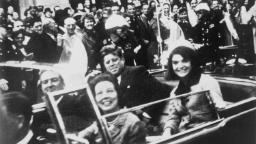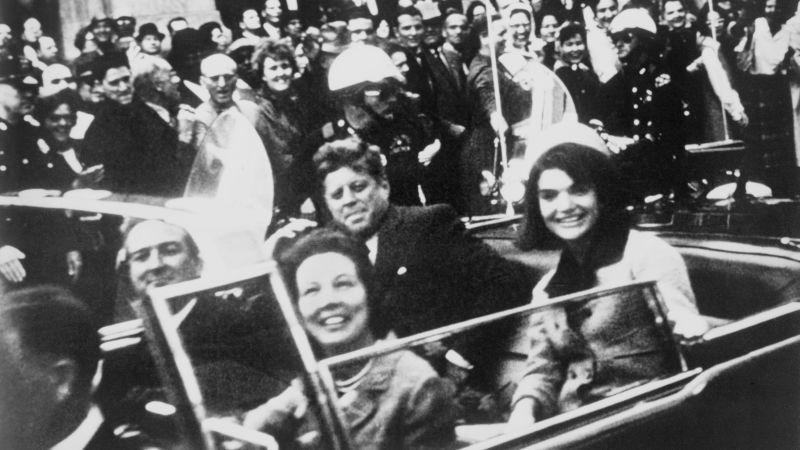
A version of this story appeared in CNN’s What Matters newsletter. To get it in your inbox, sign up for free here.
CNN
—
It’s hard to believe there’s a new eyewitness account from a Secret Service agent who was right there at the assassination of John F. Kennedy.
This is, after all among the most investigated, revisited and argued about events in US history.
But Paul Landis, who in 1963 was a young agent detailed to protect the first lady, Jacqueline Kennedy, shares recollections in a new memoir, “The Final Witness,” to be published next month. The 60th anniversary of the assassination is in November.
What Landis remembers about being near Kennedy’s body could challenge elements of the so-called magic bullet theory, that one of the bullets that struck Kennedy also wounded then-Texas Gov. John Connally. According to the Warren Commission, the intact bullet was discovered when it was knocked onto the floor next to a stretcher holding Connally.
Appearing in his first television interview on CNN’s “The Lead with Jake Tapper” Wednesday, Landis, now 88, described the assassination and said he retrieved a bullet from the limousine that had carried the Kennedys. Landis said he later placed it in the exam room where the president was being treated at Parkland Memorial Hospital.
He described a chaotic scene and his split-second decisions both to remove the bullet from the limousine and then place it next to the president.
“I thought, well, this is the perfect place to leave the bullet, it’s an important piece of evidence and this was the opportunity to leave it,” Landis said.
“Everything was pretty stressful for all the agents,” Landis told Tapper, explaining why he did not tell supervisors about the bullet at the time or in the intervening decades.
“I just stayed in view of Mrs. Kennedy,” Landis said. “I was afraid I was going to pass out and I kept telling myself I’ve got to hang in there.”a
He was never interviewed by the Warren Commission Report and said he was afraid that if he was, he would have broken down “and be an embarrassment to the Secret Service.”
Haunted by his experience, Landis said he left the Secret Service less than a year after the assassination.
There are differing positions on what to make of Landis’ memoir
Jefferson Morley edits a substack newsletter, JFK Facts, that pushes for more transparency in the official record on the Kennedy assassination. He has long doubted the “magic bullet” theory and deconstructed official government reports.
“Landis shows that this is an open question and we really need a much better explanation of what happened on November 22, 1963,” Morley told CNN’s Abby Phillip earlier this week.
Another expert says Landis has not altered the basic conclusions of numerous government reports and exhaustive investigations. Farris Rookstool III is a former FBI analyst who reviewed Kennedy assassination documents.
“The problem with all of this is that it does not change the basic fact that three shots were fired from the southeast corner of the Texas School Book Depository… using Lee Harvey Oswald’s rifle,” Rookstool told Phillip.
It would be impossible to go over all the evidence and foolish to try
If you want to spend days going down rabbit holes of evidence, reports and declassified documents, head on over to the National Archives website. They’ve got the Warren Commission report, which most people now feel was incomplete and rushed.
The National Archives has also posted the work of a congressional investigation that checked the Warren Commission’s work, the House special committee on assassinations, which issued a 1979 report that also found Oswald fired three shots and that two struck Kennedy. The House investigation did not rule out the possibility of another shooter and it also also suggested the evidence pointed to some kind of conspiracy, but not to any suspects. The committee found there was no evidence the Cuban government, the mafia or the CIA were involved.
Despite promises by multiple presidents and a law passed by Congress in 1992, the CIA, the Defense Department and the Department of State all continue to have documents they refuse to publicly release.
Although that 1992 law was passed in an effort to build up credibility and cut down on secrecy, reading the 1998 report of a special board set up at the National Archives to push the American national security apparatus to comply with the law is a study in bureaucratic infighting.
The vast majority of documents – millions of them – have been released. But the transparency effort continues. Documents were released just last month, although as with many recently released documents they are still redacted, the typeset is extremely difficult or impossible to read, and their connection to the assassination investigation is not clear.
Biden and Trump both allowed these agencies to keep some documents secret
While both the Biden and Trump administrations released tens of thousands of documents, they allowed others to be kept hidden.
President Joe Biden required agencies to write down a justification for why documents should stay hidden.
It mostly boils down to not wanting to out confidential sources who are still alive, or might be alive, and protecting methods. The CIA says it will wait until people either die or can be presumed dead at the age of 100 before releasing that information.
As a result, it continues to hide thousands of documents, inventoried in a 118-page index.
The CIA’s own historian has described the agency’s selective cooperation and outright hiding of information from the Warren Commission and the House committee as a sort of “benign coverup.” Read that history at the non-governmental transparency website National Security Archive and get some context around it from Kennedy assassination expert Philip Shenon.
Shenon and the historian Larry Sabato of the University of Virginia have been among those poring over the documents released in recent years, some of which suggested doubt even within the CIA about the official assassination story.
Many of the questions revolve around Oswald’s trip to Mexico City weeks before the assassination. Under surveillance by the CIA, he visited the Cuban and Soviet embassies, apparently trying to get a visa to flee the US.
For all of its failings – and there are many – Sabato wrote in 2013 for CNN about how the main points of the Warren Commission report hold.
A majority, 54%, said in a 2018 CBS News poll there was a coverup. In 2013, 61% said in a CBS poll that others, in addition to Oswald were involved. That’s actually down from 1998, when 76% said they believed others were involved. When CNN asked in 2013 who people believed were involved, a third of the country, 33%, suspected the CIA had something to do with it. But in that 2013 poll, not insubstantial minorities also suspected the mafia and then-Vice President Lyndon B. Johnson could have been involved.
After watching the Landis interview and reading that there are still classified CIA documents, I asked Sabato if he stands by that 2013 argument that the basic thrust of the Warren Commission holds.
“Yes, I still believe Oswald was the lone gunman—despite everything,” Sabato told me in an email.
“By ‘everything’ I mean the inadequacies of the Warren Report, the FBI’s admitted destruction of important evidence, the CIA’s untruths about Oswald as well as the agency’s refusal to release all its JFK assassination documents, and so on.”
He wishes the Warren Commission had interviewed Landis and others back in 1963 rather than simply accepting statements without cross-examination.
“There has been too much magical thinking by theorists since the 1960s,” Sabato said, pointing to the many, frequently outlandish theories you can easily find on the internet.
That said, Sabato said he understands why people don’t believe the commission’s findings. And he made an important point that extends well beyond the Kennedy assassination.
“Our own government and its top agencies gave people plenty of reasons to doubt what they’ve said about Kennedy’s murder,” Sabato said. “In 1963 we bought pretty much anything the authorities told us—that’s how we were raised. Now, though, after decades of government lying about Vietnam, Watergate, Iran-Contra, 9/11, Afghanistan, Iraq, and a thousand other things, can you blame people for not buying what the Warren Commission was selling?”
CORRECTION: This story has been updated to correctly reflect the year President John F. Kennedy was assassinated.

